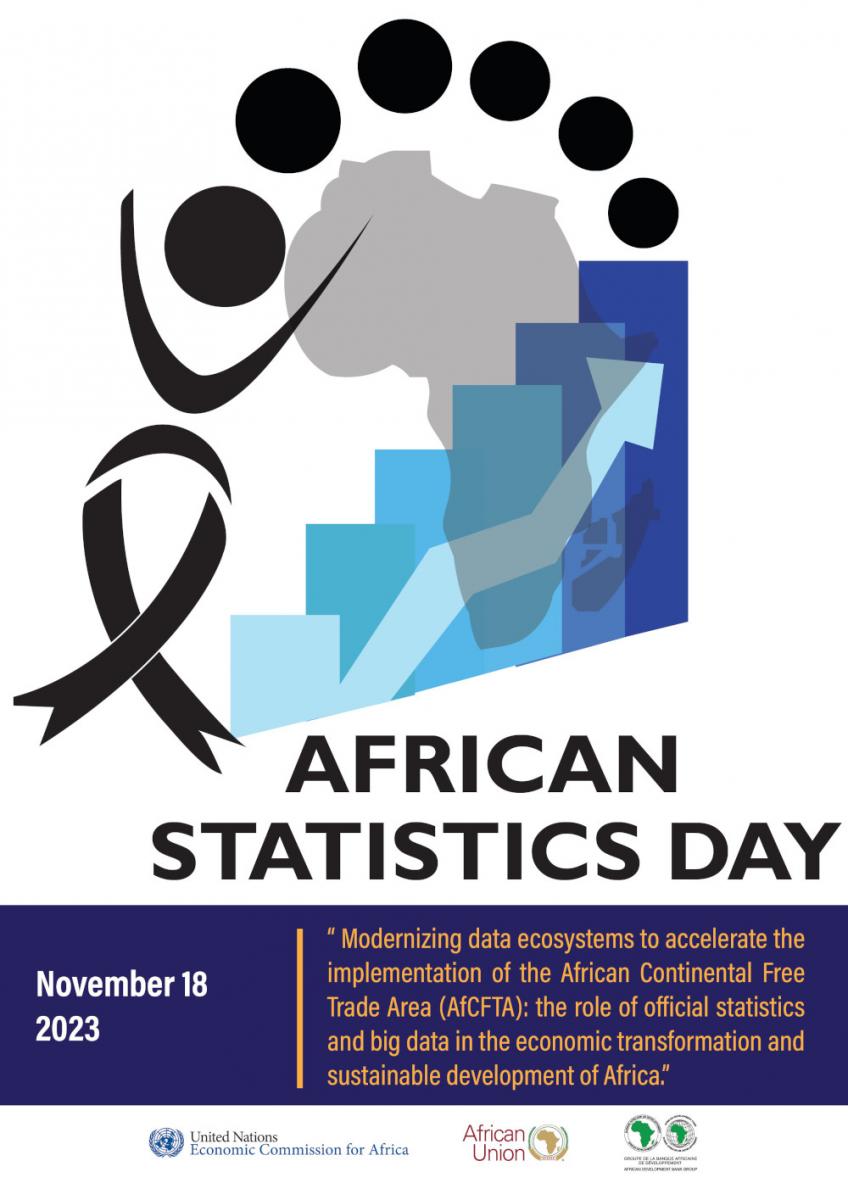Background
African Statistics Day is an annual event that is celebrated on 18 November to raise public awareness of the importance of statistics in all aspects of social and economic life. In 2023, it will be held under the theme “Modernizing data ecosystems to accelerate the implementation of the African Continental Free Trade Area (AfCFTA): the role of official statistics and Big Data in the economic transformation and sustainable development of Africa”. The theme aligns with the African Union theme of the year 2023, “Acceleration of the AfCFTA Implementation”, and encapsulates the call to modernize data systems on the continent to produce and use high-quality official statistics and seize the opportunities that big data presents.
The theme for African Statistics Day in 2023 was chosen to raise awareness among decision makers, technical and financial partners, data producers and users, researchers and the public of the importance of official statistics and big data to accelerate the implementation of the Agreement Establishing the African Continental Free Trade Area and promote intracontinental trade.
The creation of the African Continental Free Trade Area is the realization of the long-held dream of the founding fathers of the Organization of African Unity to build an African common market. At its launch, at the tenth extraordinary session of the Assembly of Heads of State and Government of the African Union, held in Kigali on 21 March 2018, the agreement was signed by 44 countries. The scope of the agreement is large, covering trade in goods and services, investment, intellectual property rights and competition policy. For the purposes of fulfilling and realizing the objectives of the agreement, States parties shall:
(a) Progressively eliminate tariffs and non-tariff barriers to trade in goods;
(b) Progressively liberalize trade in services;
(c) Cooperate on investment, intellectual property rights and competition policy;
(d) Cooperate on all trade-related areas;
(e) Cooperate on customs matters and the implementation of trade facilitation measures;
(f) Establish a mechanism for the settlement of disputes concerning their rights and obligations;
(g) Establish and maintain an institutional framework for the implementation and administration of the agreement.
Impact of the Agreement Establishing the African Continental Free Trade Area on the economy of Africa
Considering the internal challenges facing Africa and the disruption to the global economy that has been caused by the coronavirus disease (COVID-19) pandemic and the war between the Russian Federation and Ukraine, the creation of the vast African Continental Free Trade Area is a major opportunity to help African countries to diversify their exports, accelerate growth and attract foreign direct investment. The Agreement Establishing the African Continental Free Trade Area benefits its States parties through the reduction in tariffs, which will lead to lower prices of imported goods for consumers and of intermediate inputs for producers. The continent has embarked on the gradual elimination of tariffs on 90 per cent of goods and the reduction of barriers to trade in services. The expected growth in trade includes an increase in intracontinental exports of more than 80 per cent and a doubling of intracontinental imports. Following the implementation of the agreement, intra-African trade will grow to $532 billion in 2035, compared with a baseline scenario of $294 billion. Moreover, real income will increase by 7 per cent by that year. The gains represent approximately $445 billion in 2035 (at 2014 prices and exchange rates). The agreement has the potential to lift 30 million people out of the extreme poverty in which one third of the African population currently lives.
Modernizing data systems to accelerate the implementation of the Agreement Establishing the African Continental Free Trade Area
The role of the national statistical systems in Africa and their commitment to the modernization of data systems are critical for informing policy interventions related to the African Continental Free Trade Area. Moreover, the statistical community has recognized that producers of official statistics need to transform and modernize to respond adequately to all the data demands arising from the 2030 Agenda for Sustainable Development, Agenda 2063: The Africa We Want, of the African Union, the 10-year strategy of the African Development Bank for the period 2023–2032, subregional and national development plans, and other agendas and frameworks. The transformation and modernization concerns all areas of official statistics, including emerging statistics, such as digital, agricultural, environmental and climate statistics, the institutional statistical environment, production processes, coordination and collaboration. In 2020, the Statistical Commission for Africa created an African group on the transformation and modernization of official statistics to provide strategic guidance and coordinate the work on the transformation and modernization of the national statistical systems in Africa.
In 2023, the Economic Commission for Africa launched a road map for the transformation and modernization of official statistics in Africa for the period 2023–2030, in the context of the activities undertaken by the African group on transformation and modernization of official statistics. The aim of the road map is to guide national statistical systems and their partners in sustainably and efficiently meeting the needs of statistical users and in planning for resilience, innovation and agility.
In the context of accelerating the implementation of the Agreement Establishing the African Continental Free Trade Area, in particular after the COVID-19 pandemic, there is an emerging need for digital technologies in cross-border trade. That need and the role of data governance in Africa was discussed during the 2022 United Nations Conference on Trade and Development E-commerce Week.
Moreover, big data, non-traditional data sources and data science hold enormous potential. The wide variety of data sources, including mobile devices, satellite imagery, scanner data, e-commerce and the Internet of things, can offer new insight. Such sources help to provide a deep understanding of intracontinental trade patterns, predict future trends, identify potential bottlenecks and reveal hidden opportunities. Information from big data is pivotal in guiding policy decisions, shaping trade strategies and, most importantly, ensuring the successful implementation of the Agreement Establishing the African Continental Free Trade Area.
In addition, for the Agreement Establishing the African Continental Free Trade Area to be inclusive and to ensure shared growth across the continent, women, young people and small and medium-sized enterprises must be at the heart of its implementation through the use of quality and accurate statistical information.
Finally, African countries are called upon to redouble their efforts to implement the Agreement Establishing the African Continental Free Trade Area as a tool to create a fundamental and structural transformation of the economy of Africa and place the continent on a path of long-term industrial development within the guidelines of the Strategy for the Harmonization of Statistics in Africa 2017–2026, adopted by the Head of States and Government of the African Union.


